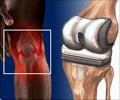A new research has found increase in total knee replacement surgeries among Americans.

The study, funded by the U.S. National Institutes of Health's National Institute of Arthritis and Musculoskeletal and Skin Diseases, found that more than 4.5 million Americans are currently living with at least one TKR. This represents 4.7 percent of the population age 50 years or older – higher than the national rates for congestive heart failure and rheumatoid arthritis. In addition:
- The prevalence of osteoarthritis is higher in women and so is TKR: 5.3 percent, compared to 4.1 percent in men.
- Among persons age 60 to 69, 4.1 percent of men and 4.8 percent of women have a TKR; among those ages 70 to 79, 7.1 percent of men and 8.2 percent of women have had at least one knee replaced.
- Ten percent of Americans age 80 and older are living with a TKR.
"The number of total knee replacements is growing drastically," said Elena Losina, PhD, lead investigator and co-director of Orthopedic and Arthritis Center for Outcomes Research at Brigham and Women's Hospital in Boston, Mass. "We now have a lot of people living with TKR," which may lead to substantial increases in the likelihood of revisions and complications, especially in younger patients.
The findings may aide in anticipating the future challenges related to TKR, including capacity for follow-up care, health care costs, and treatment access.
Source-Eurekalert









